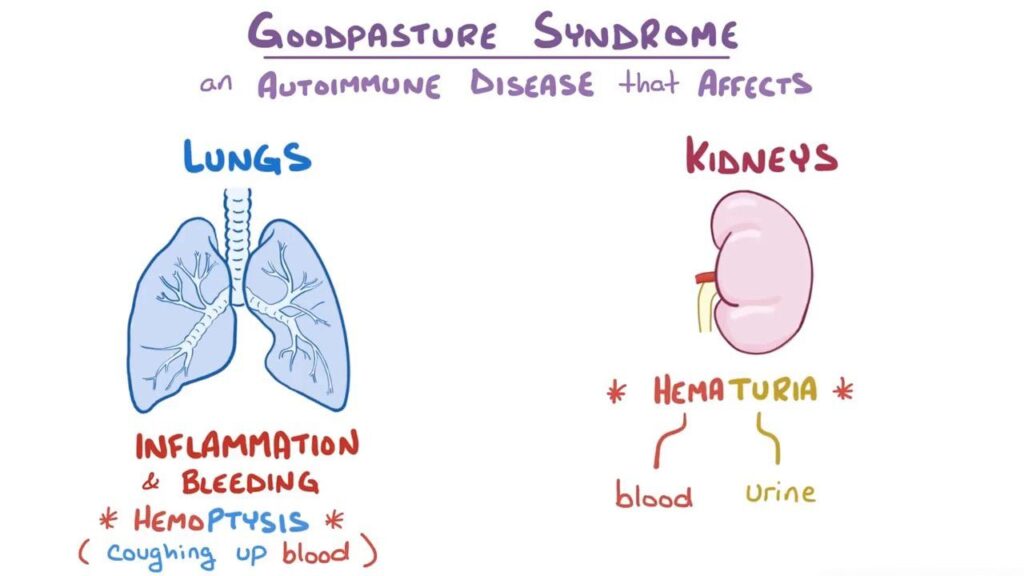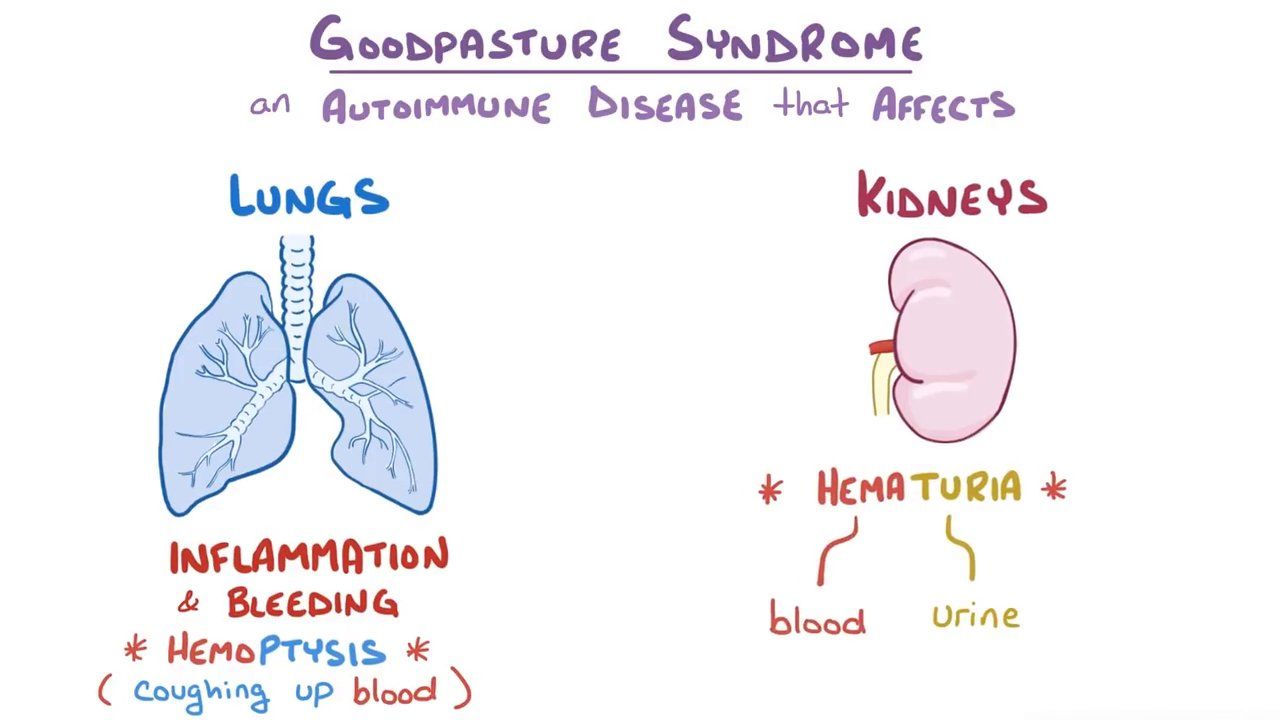Goodpasture syndrome, also known as anti-glomerular basement membrane (anti-GBM) disease, is a rare autoimmune disease that mainly affects the lungs and kidneys. It is characterized by the production of autoantibodies especially against the glomerular basement membrane of the kidney and the alveolar basement membrane of the lungs. The exact cause of

Goodpasture syndrome is not fully understood, but it is believed to be a combination of genetics and environment. Sometimes it can be caused by exposure to hydrocarbons, solvents or certain chemicals.
This condition is usually manifested by symptoms involving the kidneys and lungs.
Signs and symptoms may include:
Kidney symptoms:
Blood in the urine (hematuria)
Protein in the urine (proteinuria)
Low urine output
High blood pressure
Lung symptoms:
Cough
Shortness of breath
Chest pain
Coughing up blood (Hemoptysis)
Goodpasture’s syndrome can progress rapidly if left untreated and lead to kidney and lung damage. Diagnosis usually relies on blood and urine tests as well as imaging studies and kidney tests to detect the presence of antibodies to GBM.
The basic treatment of Goodpasture’s syndrome consists of a combination of antiretroviral therapy and plasmapheresis. Antibiotics such as corticosteroids and cyclophosphamide are used to suppress the immune system and reduce autoantibody production. Plasmapheresis or plasma exchange is a method that removes autoantibodies from the blood.
With early diagnosis and appropriate treatment, the outcome of Goodpasture’s syndrome is greatly improved. However, the condition can still be life-threatening, especially if the kidneys or lungs fail. Regular monitoring and regular treatment may be necessary to control the disease and prevent recurrence.
Consulting a physician is essential for proper diagnosis and effective management of Goodpasture syndrome or other conditions.
Goodpasture syndrome symptoms?
Goodpasture syndrome, also known as anti-glomerular basement membrane (anti-GBM) disease, is a rare autoimmune disease that mainly affects the kidneys and lungs. It is characterized by the presence of autoantibodies that attack the basement membrane, a thin layer of tissue that covers the glomeruli of the kidneys and alveoli of the lungs. It was described by Ernest Goodpasture in 1919.
The most common symptoms of Goodpasture’s syndrome are:
Hemoptysis: Blood when coughing is one of the symptoms of the disease. Blood may appear in sputum or coughed up sputum.
Proteinuria: Excess protein in the urine. Damaged glomeruli in the kidneys allow protein to enter the urine, causing proteinuria.
Hematuria: Damaged glomeruli can cause blood cells to enter the urine and cause hematuria.
The color of urine can be red, pink or brown.
Fatigue: Many people with Goodpasture syndrome have fatigue, which can be caused by diabetes, due to blood loss in the urine.
Shortness of breath: As the disease progresses, pneumonia can cause shortness of breath, cough and chest pain.
High blood pressure: Some people with Goodpasture syndrome may develop high blood pressure due to kidney damage.
It is important to remember that symptoms vary from person to person and some people may not experience all of the symptoms listed above.
Goodpasture syndrome can be life-threatening if left untreated, so it’s important to seek medical attention right away if you experience these symptoms. Doctors may perform tests such as blood and urine tests to confirm the diagnosis and begin appropriate treatment.
Goodpasture Syndrome Diagnosis
Goodpasture Syndrome affects the lungs and kidneys. It is characterized by the production of autoantibodies called anti-glomerular basement membrane (anti-GBM) antibodies that attack the basement membrane of both the kidneys and lungs. Diagnosing Goodpasture Syndrome usually involves the following steps:
Medical history and physical exam: The doctor will review your medical history and ask questions about your symptoms, such as breathing problems, coughing up blood, or kidney problems. They will also perform a physical exam to check for signs of kidney or lung involvement.
Blood and urine tests: Blood and urine tests are done to check for antibodies to GBM and to measure kidney function. Blood tests measure the levels of antibodies to GBM and other markers, while urine tests measure the presence of blood and protein in the urine.
Chest X-ray or CT scan: Imaging tests such as a chest X-ray or CT scan may be done to check for abnormalities in the lungs, such as bleeding or inflammation.
Kidney Biopsy: Renal Biopsy is an important diagnostic method to confirm Goodpasture syndrome. It involves taking a small sample of kidney tissue with a needle and examining it under a microscope. Biopsy may reveal characteristic changes such as the presence of anti-GBM antibodies and damage to the glomerular basement membrane.
Pulmonary Function Tests: If lung involvement is suspected, a pulmonary function test may be performed to measure lung function and determine the severity of shortness of breath. It is important to remember that
Goodpasture syndrome is a complex problem and diagnosis often requires the expertise of a physician, including a nephrologist (especially kidney) or a pulmonologist (pulmonologist). If you think you have Goodpasture syndrome or are experiencing symptoms, it’s important to consult a doctor to get the right diagnosis and treatment.
Goodpasture Syndrome Treatment
Goodpasture syndrome, also known as anti-glomerular basement membrane (anti-GBM) disease, is a rare autoimmune disease that mainly affects the kidneys and lungs. Treatment of Goodpasture syndrome usually includes a combination of anti-inflammatory and supportive measures. The main points of treatment are:
Plasmapheresis: Plasmapheresis is a procedure that involves removing the patient’s plasma (containing autoantibodies against the glomerular basement membrane) and replacing it with blood donors or blood transfusions. Plasmapheresis helps to quickly remove antibodies from the blood.
Antibiotics: Corticosteroids and antibiotics are used to prevent infections and reduce autoantibody production. Commonly used medications include cyclophosphamide or rituximab, often combined with corticosteroids.
Supportive Care: Goodpasture Syndrome can cause kidney and lung damage, leading to kidney failure and respiratory failure. Support includes measures to manage these issues. Dialysis or kidney transplant may be required for kidney failure. A ventilator should be used for respiratory failure.
Monitoring and follow-up: Regular monitoring of kidney function, lung function, and antibody levels is important to assess response to treatment and adjust management plans. This helps assess the activity of the disease and guides the timing and use of antibiotics.
It is important to remember that treatment will vary depending on the severity of the disease and the patient’s condition. Treatment is usually done under the supervision of nephrologists and pulmonologists specializing in kidney and lung diseases. Early diagnosis and timely treatment are important for improving the symptoms of Goodpasture syndrome.
Goodpasture disease vs Goodpasture Syndrome
Goodpasture’s disease and Goodpasture’s syndrome are two terms used interchangeably to describe a rare autoimmune disorder caused by the presence of autoantibodies that attack the lungs and kidneys. Although these two terms are often used to mean the same thing, their meanings are slightly different.
Goodpasture’s disease means that the kidneys are involved in an autoimmune attack. In this case, the immune system produces autoantibodies called anti-glomerular basement membrane (anti-GBM) antibodies that target the part of the kidney called the glomerular basement membrane. This immune system causes inflammation and damage to the kidneys leading to glomerulonephritis.
Goodpasture syndrome affects the kidneys and lungs. In addition to the damage the GBM vaccine does to the kidneys, people with Goodpasture’s syndrome also have damage to the alveoli, the tiny air sacs in the lungs responsible for oxygen exchange. The immune system can cause bleeding in the lungs, coughing up blood (hemoptysis), and respiratory failure. It is important to remember that
Goodpasture syndrome is considered an autoimmune disease because it affects many organs. However, the term “Goodpasture’s disease” is often used to refer to the kidney-specific manifestation of the disease, while “Goodpasture’s syndrome” is used to describe both kidney and lung disease.
Treatment of Goodpasture’s disease/symptoms is usually a combination of corticosteroids and anti-inflammatory drugs such as cyclophosphamide to prevent infection and reduce inflammation. Additionally, plasmapheresis can be performed to remove harmful autoantibodies from the blood. In severe cases, dialysis or a kidney transplant is needed to treat kidney failure.
Because it is a rare and potentially serious condition, it is important to consult a healthcare professional for the proper diagnosis and treatment of Goodpasture’s disease/syndrome.

